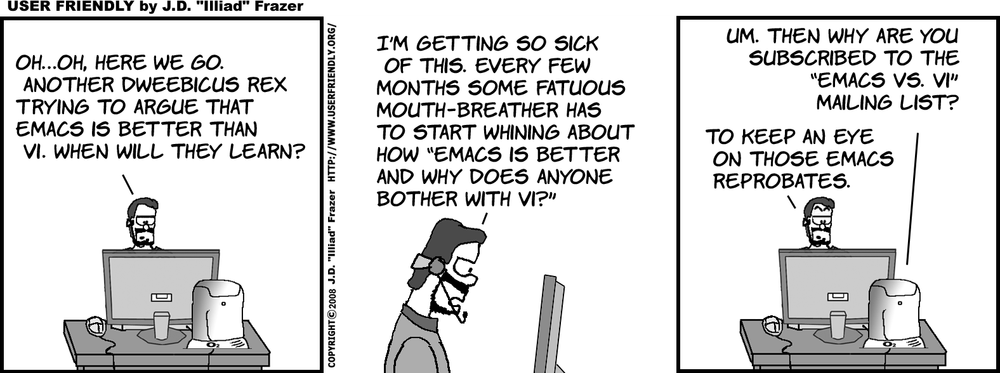Tastes Great, Less Filling
vi is [[13~^[[15~^[[15~^[[19~^[[18~^ a muk[^[[29~^[[34~^[[26~^[[32~^ch better editor than this emacs. I know I^[[14~'ll get flamed for this but the truth has to be said. ^[[D^[[D^[[D^[[D ^[[D^[^[[D^[[D^[[B^ exit ^X^C quit :x :wq dang it :w:w:w :x ^C^C^Z^D— Jesper Lauridsen from
alt.religion.emacs
We can’t discuss vi as part of Unix culture without acknowledging what is perhaps the longest running debate in the Unix community:[80]vi versus Emacs.
Discussions about which is better have cropped up on comp.editors (and other newsgroups) for
years and years. (This is illustrated nicely in Figure D-10.) You will find summaries of some of
these discussions in the many web sites described earlier. You will
find pointers to more recent versions on the web pages.

Some of the better arguments in favor of vi are:
vi is available on every Unix system. If you are installing systems, or moving from system to system, you might have to use vi anyway.
You can usually keep your fingers on the home row of the keyboard. This is a big plus for touch typists.
Commands are one (or sometimes two) regular characters; they are much easier to type than all of the control and metacharacters that Emacs requires.
vi is generally smaller and less resource-intensive than Emacs. Startup times are appreciably faster, sometimes up to a factor of 10. ...
Get Learning the vi and Vim Editors, 7th Edition now with the O’Reilly learning platform.
O’Reilly members experience books, live events, courses curated by job role, and more from O’Reilly and nearly 200 top publishers.

